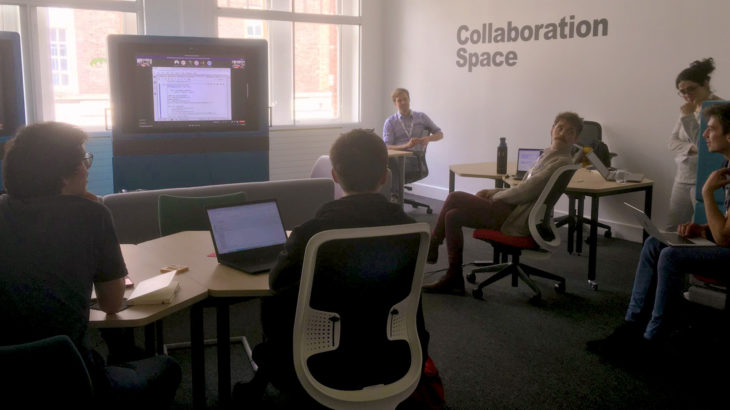Research technology professionals – adding value to research teams

In May, we brought together more than 100 participants in an event shining the spotlight on a vital, yet often overlooked group of colleagues – research technology professionals.
The aim of the event was to show the contribution that RTPs make to research and to help people interested in these roles – which include software engineers and data analysts – to make sense of the progression routes for RTPs.
We had a host of speakers, including several in these roles along with colleagues managing research teams. But it was also important to hear from funders and senior researchers leading the programmes supported by these multidisciplinary teams.
We were delighted to welcome Professor Neil Ferguson, vice-dean (Academic Development) at Imperial College London’s Faculty of Medicine, as the keynote speaker. His presentation outlined the role his team have had in modelling transmission and interventions, during the Coronavirus pandemic, which has helped to accelerate an understanding of the disease and influence the government’s response.
Ferguson described how the team had been built incrementally over several years, bringing together research software engineers (RSE) with researchers operating high performance computing and other specialist roles, resulting an 11-strong team.
Software engineering teams have dramatically improved coding practice across researchers, post docs and PhDs
Professor Neil Ferguson
Now, he says, academics applying for grants are more likely to see the value of specialists such as RSEs whereas previously they would have used post-doctoral researchers for specialist tasks. A real team culture has developed and the RSEs are helping to improve the quality of research, he said.
“The same software engineering teams have dramatically improved coding practice across researchers, post docs and PhDs,” Ferguson observed.
‘Happy researchers’
We later heard from practitioners who discussed their careers and the value they add as RTPs. All speakers agreed that having a team of RTPs is more impactful than having them distributed throughout different groups.
Amy Strange, head of software engineering and AI at the Francis Crick Institute, put it succinctly – RTPs working with your research teams “makes happy researchers”.
Dr Andrew Richards, a hardware specialist at Imperial College London, expanded on this theme explaining that RTPs in roles like his are “adding value for researchers by reducing time to publication”.
While the recognition of some roles, notably RSEs is growing, the speakers noted that there is still some way to go for these roles to receive parity with more traditional research roles.
Professor Simon Hettrick, of Southampton’s Software Sustainability Institute called for “a culture change” and for fuller recognition of RTPs’ outputs, which he is championing through the Hidden REF.
Tom King, assistant director for research at Queen Mary said that there is now a reliance on RTPs yet added that there is a tendency to take them for granted. “It’s like plumbing,” he said. “It’s invisible to you.”
And that reliance on RTPs creates a demand for their skills, with many of the speakers explaining how their teams are expanding and Dr Michael Ball, head of research infrastructure at the Biotechnology and Biological Sciences Research Council, discussing his employer’s mission to grow the number of professionals working in these roles.
‘Talent pipeline’
For Richards, bringing in new talent from different backgrounds is crucial to meeting this demand. He said promoting and funding apprenticeships was one way to help “build the talent pipeline”
Fortunately, there are many different RTP roles and these can be filled by people from a variety of different research backgrounds, and none.
Those different backgrounds were well represented among the speakers. Richards started as a geologist who became more interested in computing than the geology, while Strange worked in the private sector before joining the Crick.
But the speakers were split when it came to the importance of doing a PhD. For Professor Nicola Shelton, director of CeLSIUS and based at UCL, a PhD is important for career progression as a research data specialist because it allows you to lead supervise PhD students. However, other speakers, particularly those in managerial or more technical RTP roles said there were careers within the RTP family where a doctorate was not essential.
It’s not enough just to be able to write lines of code.
Dr Mary Chester-Kadwell
Shelton, whose institute supports the use of the ONS Longitudinal Study, added that recognising your transferrable skills, can help researchers progress as RTPs. She went on to list some of the skills she had picked up in previous roles that she has applied to her work as a research data specialist.
As Dr Mary Chester-Kadwell, a senior software engineer at Cambridge University library, put it, “there is no wrong or right way to become an RTP”.
She added: “In one way or another, they all have a vital role to play in research. They need to be able to bridge the technical skills with human thinking – it’s not enough just to be able to write lines of code.”
Making the Magic Happen with research data, software & infrastructure took place on 26 May 2022. it was an opportunity to find out about research technology professionals and how they are essential to effective research across many domains. This event was organised by Science and Engineering South, in collaboration with RSLondon and UCL eResearch Domain


